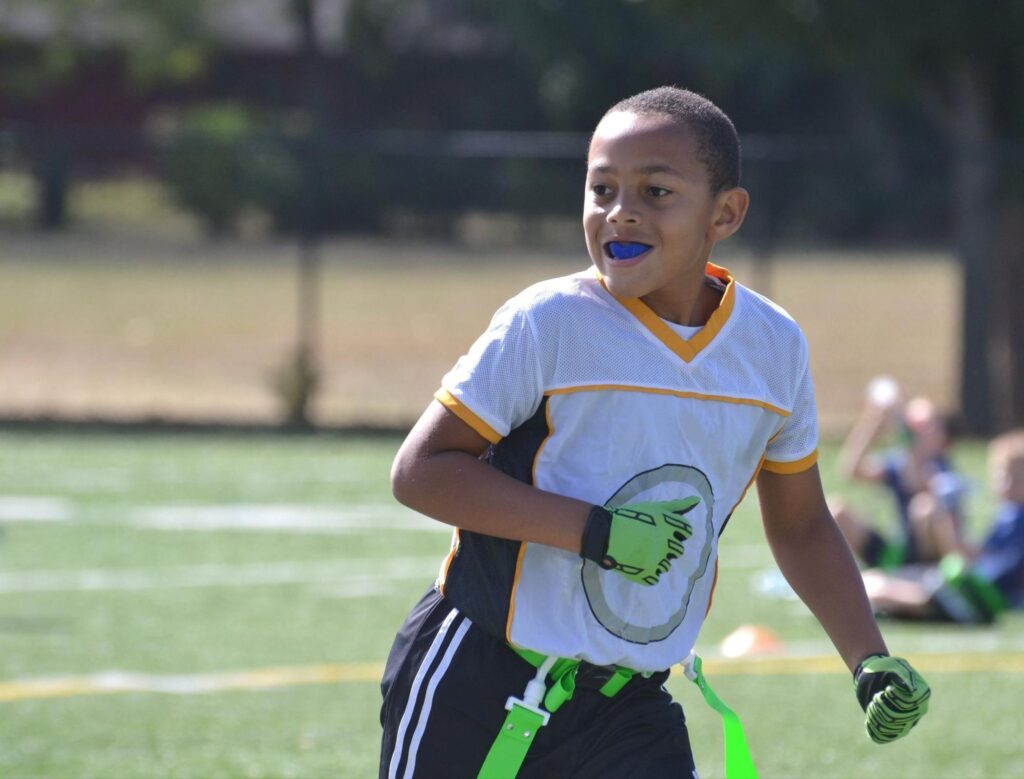Sports can be a significant part of the lives of both children and adults! If you’re curious about how having braces might impact your participation in sports, our team at Dr. Jared Lee Orthodontics is here to address this question: Can I still play sports with braces?
How Braces Function
Comprehending the components of braces is crucial for understanding the potential risks of damage. These orthodontic appliances consist of several key elements, all of which can be vulnerable to harm.
- Brackets: These fixtures are shaped like squares and are bonded with a special adhesive to the front of each tooth, serving as supports for wires.
- Elastics: These can be attached to the brackets to apply additional force to certain teeth as needed. They come in a lot of colors! Larger elastic components, known as bands, usually assist in jaw alignment.
- Wires: Wires put pressure on the teeth to guide them into alignment and connect the brackets to one another. They’re routinely tightened and adjusted through treatment.
A Guide to Sports
Now, let’s discuss a series of different sports, their risk factors, and begin to explain how mouthguards are an essential tool for patients with braces.
- Contact Sports:
- Football is generally a high-collision sport with almost any player involved, so mouthguards aren’t optional.
- Basketball is similarly risky in terms of contact and potential falls.
- Hockey players are provided with heavy face masks or shields for added protection during play–but wearing a mouthguard is critical due to risk of traumatic mouth injury.
- Combat Sports:
- Boxing often involves blows to the mouth or mouth area, necessitating the use of mouthguards.
- Martial arts categories such as karate, taekwondo, and judo require protection in lieu of direct impacts and strikes as well.
- Non-Contact Sports
- Running with braces is usually fine—though mouthguards can still be a wise option for training.
- Swimming can carry a risk of injury related to pool edges and especially diving boards.
- Cycling is typically a low-contact sport, but mouthguards during races or mountain biking activities are highly recommended for safety.
- Racquet Sports
- Tennis players often need mouthguards during matches and practice sessions. The velocity associated with injuries from a ball or a racquet can have dire consequences if braces are unprotected.
- Team Sports
- Soccer players can definitely be subject to injury, especially during training.
- Volleyball players even more so, depending on their positions and roles on the court.

Smarter, Not Harder
The good news is you can totally play sports with braces. But there are considerations and rules to follow to avoid injury.
- Wear Your Mouthguard: Ensure you wear a mouthguard specifically designed for athletes with braces. These mouthguards offer additional cushioning to shield against impact, reducing the risk of injuries to the teeth and braces, as well as other soft tissue areas.
- Choosing the Right Mouthguard: Opt for a mouthguard tailored to accommodate braces, ensuring a comfortable and secure fit. Avoid using standard mouthguards, as they may not fit properly over braces and can cause discomfort or injury.
- Replace it Regularly: Routinely inspect your mouthguard for signs of wear and tear, such as cracks or deformations. Replace your mouthguard promptly if you notice any damage, as a compromised mouthguard may not offer adequate protection. Also, keep it clean!
- Consistent Use: Wear your mouthguard during all sports activities, including practice sessions, to maintain protection consistently. Accidents can occur unexpectedly, so it’s crucial to prioritize consistent use.
- Be Mindful of Contact: Stay vigilant about the vulnerability of your mouth during contact sports. Avoid situations or movements that could potentially increase the risk of injury to your braces and mouth.
- Communicate with Your Coach: Keep your coach or instructor informed about your braces and any related concerns you may have. They can adjust training drills or exercises to minimize the risk of mouth injuries during sports activities.
For personalized guidance on choosing the appropriate mouthguard and finding a suitable source, consider scheduling a consultation with Dr. Lee. He will be able to give you answers as someone who knows your individual case well.

Living Like a Champion
If you’ve recently started wearing braces and live an active lifestyle as an athlete, don’t be discouraged. Many patients successfully balance this combination, but it requires careful attention and discipline. Younger patients may find it challenging to follow all these guidelines, which is where our team comes in to provide guidance. If you or a family member are considering orthodontic treatment, please contact our Oxnard or Santa Paula offices at (805) 636-6424.
